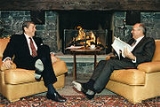|
1945
|
|
4.5.1945
Cold War: Yugoslav leader Josip "Tito" Broz signs an agreement with the Soviet Union to allow "temporary entry of Soviet troops into Yugoslav territory". |
|
8.25.1945
Ten days after World War II ends with Japan announcing its surrender, armed supporters of the Communist Party of China kill Baptist missionary John Birch, regarded by some of the American right as the first victim of the Cold War. |
|
9.5.1945
Cold War: Igor Gouzenko, a Soviet Union embassy clerk, defects to Canada, exposing Soviet espionage in North America, signalling the beginning of the Cold War. |
|
9.8.1945
Cold War: United States troops arrive to partition the southern part of Korea in response to Soviet troops occupying the northern part of the peninsula a month earlier. |
|
11.16.1945
Cold War: Operation Paperclip: The United States Army secretly admits 88 German scientists and engineers to help in the development of rocket technology. |
|
|
1946
|
|
3.28.1946
Cold War: The United States State Department releases the Acheson-Lilienthal Report, outlining a plan for the international control of nuclear power.
|
|
|
1947
|
|
4.16.1947
Bernard Baruch coins the term "Cold War" to describe the relationship between the United States and the Soviet Union. |
|
5.22.1947
Cold War: in an effort to fight the spread of Communism, U.S. President Harry S. Truman signs an act into law that will later be called the Truman Doctrine. The act grants $400 million in military and economic aid to Turkey and Greece, each battling an internal Communist movement. |
|
|
1948
|
|
4.1.1948
Cold War: Berlin Airlift – Military forces, under direction of the Russian-controlled government in East Germany, set-up a land blockade of West Berlin. * 1948 |
|
|
1950
|
|
3.1.1950
Cold War: Klaus Fuchs is convicted of spying for the Soviet Union by disclosing top secret atomic bomb data. |
|
|
1953
|
|
10.30.1953
Cold War: U.S. President Dwight D. Eisenhower formally approves the top secret document National Security Council Paper No. 162/2, which states that the United States' arsenal of nuclear weapons must be maintained and expanded to counter the communist threat. |
|
|
1955
|
|
4.24.1955
The Bandung Conference ends: Twenty-nine non-aligned nations of Asia and Africa finish a meeting that condemns colonialism, racism, and the Cold War. |
|
|
1957
|
|
11.7.1957
Cold War: The Gaither Report calls for more American missiles and fallout shelters. |
|
|
1959
|
|
12.1.1959
Cold War: Opening date for signature of the Antarctic Treaty, which sets aside Antarctica as a scientific preserve and bans military activity on the continent.
|
|
|
1960
|
|
5.1.1960
Cold War: 1960 U-2 incident|U-2 incident
|
|
5.7.1960
Cold War: U-2 Crisis of 1960
|
|
|
1961
|
|
6.23.1961
Cold War: the Antarctic Treaty, which sets aside Antarctica as a scientific preserve and bans military activity on the continent, comes into force after the opening date for signature set for the December 1, 1959. |
|
|
1964
|
|
11.27.1964
Cold War: Indian Prime Minister Jawaharlal Nehru appeals to the United States and the Soviet Union to end nuclear testing and to start nuclear disarmament, stating that such an action would "save humanity from the ultimate disaster". |
|
|
1969
|
|
11.15.1969
Cold War: The Soviet submarine K-19 collides with the American submarine USS ''Gato'' in the Barents Sea. |
|
11.17.1969
Cold War: Negotiators from the Soviet Union and the United States meet in Helsinki to begin SALT I negotiations aimed at limiting the number of strategic weapons on both sides. |
|
|
1973
|
|
|
1976
|
|
|
1981
|
|
|
1983
|
|
9.1.1983
Cold War: Korean Air Flight 007 is shot down by a Soviet Union jet fighter when the commercial aircraft enters Soviet airspace. All 269 on board die, including Congressman Lawrence McDonald. |
|
|
1985
|
|
|
1986
|
|
10.11.1986
Cold War: U.S. President Ronald Reagan and Soviet leader Mikhail Gorbachev meet in Reykjavík, Iceland, in an effort to continue discussions about scaling back their intermediate missile arsenals in Europe. |
|
|
1987
|
|
|
1989
|
|
11.17.1989
Cold War: Velvet Revolution begins: In Czechoslovakia, a student demonstration in Prague is quelled by riot police. This sparks an uprising aimed at overthrowing the communist government (it succeeds on December 29). |
|
11.28.1989
Cold War: Velvet Revolution
|
|
12.1.1989
Cold War: East Germany's parliament abolishes the constitutional provision granting the communist party the leading role in the state.
|
|
12.3.1989
Cold War: In a meeting off the coast of Malta, US President George H. W. Bush and Soviet leader Mikhail Gorbachev release statements indicating that the cold war between their nations may be coming to an end. |
|


